Tuesday, November 09, 2021
Astrometeorology 9 and final: Back to Maragha
Returning to the Astrometeorology theme after a break. I started on this in April, and ran out of graphic gumption for several months. I'll try to close it out with a better view of the Maragha observatory in Persia.
Previously I showed several of its Instruments, then later showed Brahe's expanded versions. There's plenty of documentation of Brahe's setup, including a full floor plan, so I was able to 'build' the scene with some accuracy. I finally found a usable drawing of the actual Maragha, so now I've circled back to fill in the place and the theme. I'll mix the previously drawn instruments with the new scene and new instruments.
= = = = =
Maragha is in the northern mountainous part of Persia, more Caucasus than Asia. It's high altitude semi-desert with a wide range of temperatures and little rain. Unlike Tycho's rainy Denmark, Maragha is a good place for astronomy. The various instruments could be used outside in all seasons.
The observatory, active around 1400 AD, was a school with resident teachers and scholars. The three small rectangular buildings were residences for the scholars.
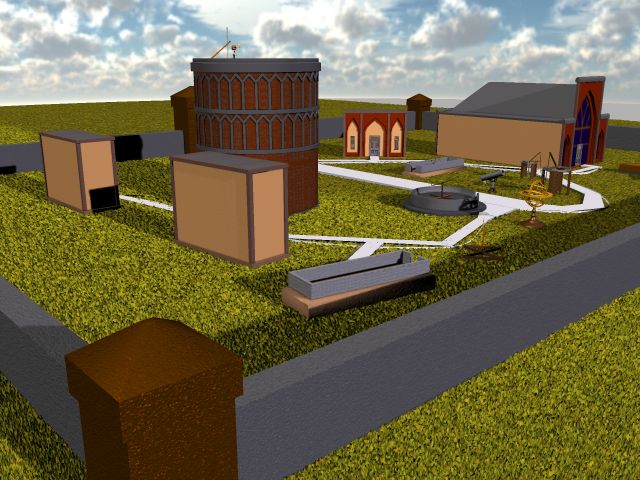 The central tower was an open observatory, essentially a raised platform.
The central tower was an open observatory, essentially a raised platform.
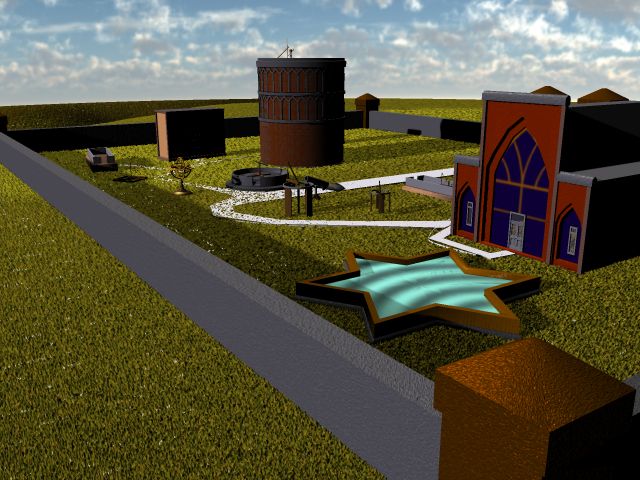 The large rectangular building was the 'commons' for meetings and classes.
The large rectangular building was the 'commons' for meetings and classes.
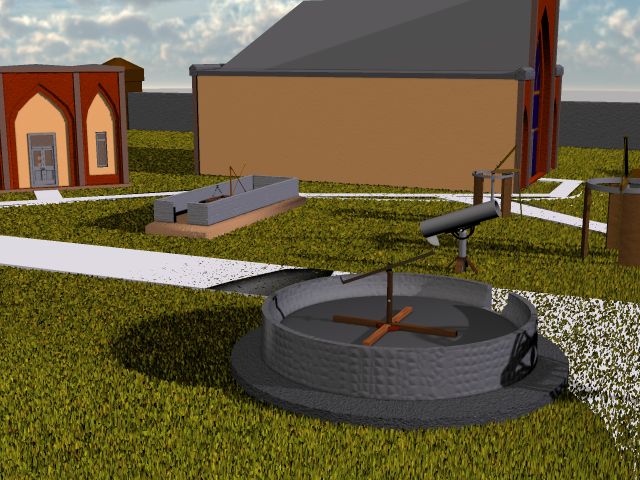 I've imagined the interior of a residence, using the Persianish furniture that I 'built' for Brahe's castle. Brahe was directly following the Persian tradition in his instruments and his astrometeorology and his architecture. Here Polistra is calculating with an astrolabe.
I've imagined the interior of a residence, using the Persianish furniture that I 'built' for Brahe's castle. Brahe was directly following the Persian tradition in his instruments and his astrometeorology and his architecture. Here Polistra is calculating with an astrolabe.
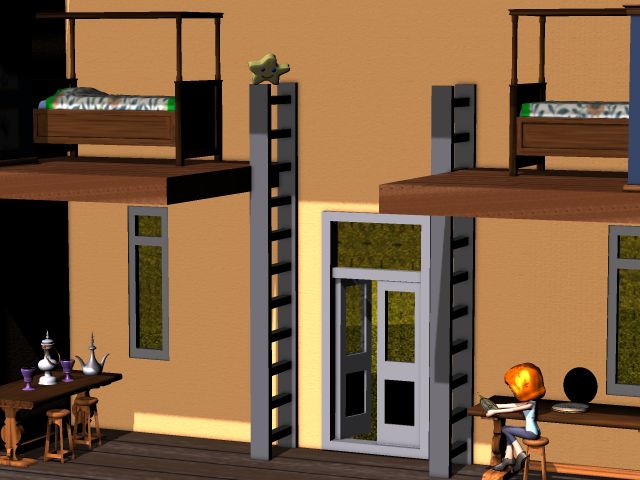 This is the tool that archeologists call Instrument 3. It's a simple sighter for both azimuth and altitude. Polistra is trying to realign with the beacons of the universe.
This is the tool that archeologists call Instrument 3. It's a simple sighter for both azimuth and altitude. Polistra is trying to realign with the beacons of the universe.
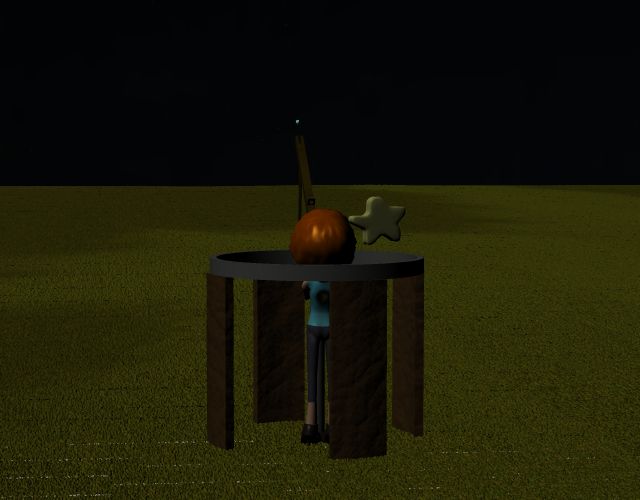
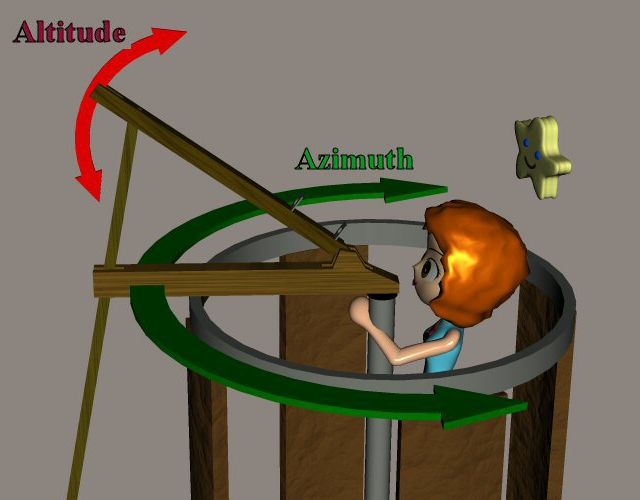 The sighting bar with two pinholes or gunsights is the alidade. It's the key element of these instruments and astrolabes.
The sighting bar with two pinholes or gunsights is the alidade. It's the key element of these instruments and astrolabes.
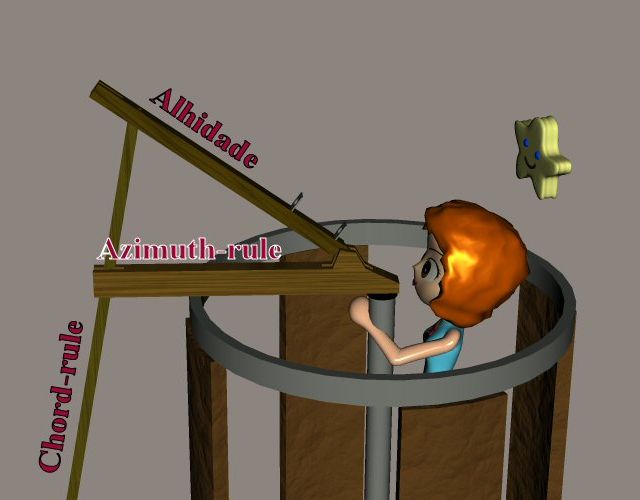 Another view of Instrument 3 in the full scene:
Another view of Instrument 3 in the full scene:
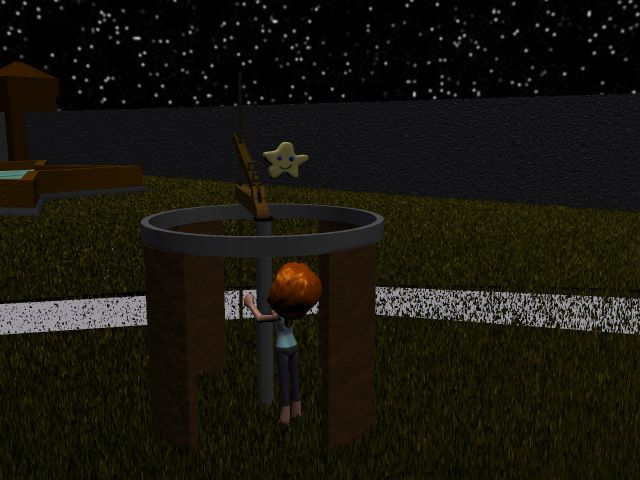 Instrument 11 was unique in its ability to switch measurement modes.
Instrument 11 was unique in its ability to switch measurement modes.
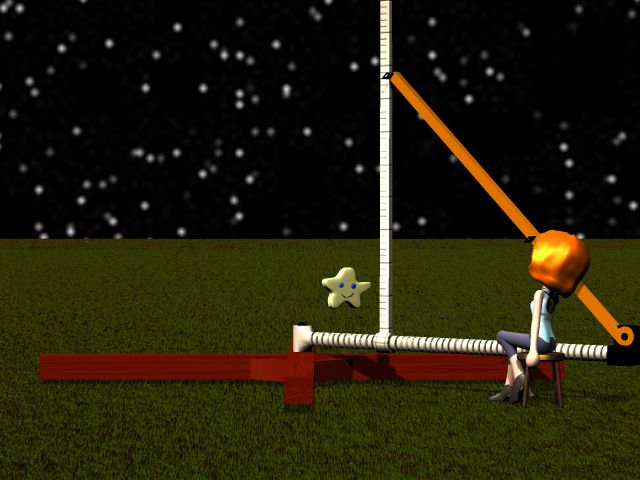 The vertical measuring stick pivoted on the horizontal rod so that it could be used two ways:
The vertical measuring stick pivoted on the horizontal rod so that it could be used two ways:
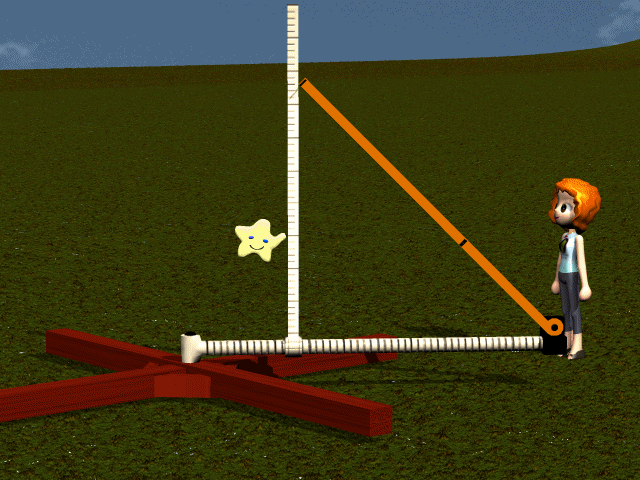 When the measuring stick was horizontal, it measured the azimuth:
When the measuring stick was horizontal, it measured the azimuth:
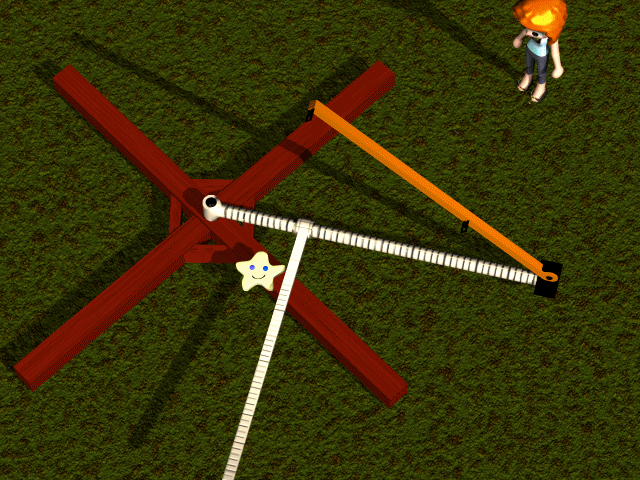 And when the measuring stick was vertical, it measured the altitude of the alidade:
And when the measuring stick was vertical, it measured the altitude of the alidade:
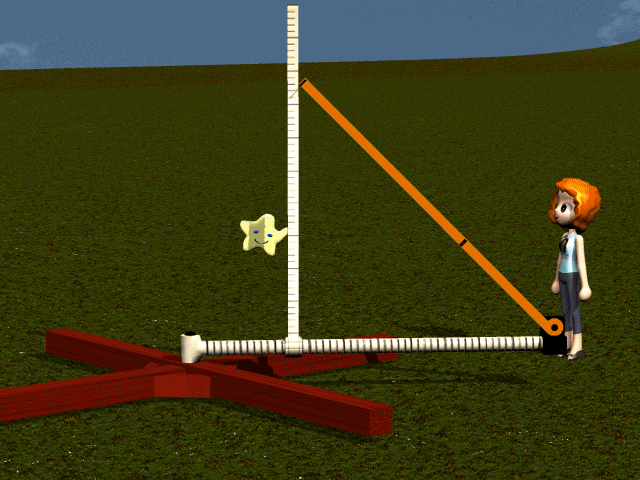 Here Polistra is using Instrument 11 from the top of the tower.
Here Polistra is using Instrument 11 from the top of the tower.
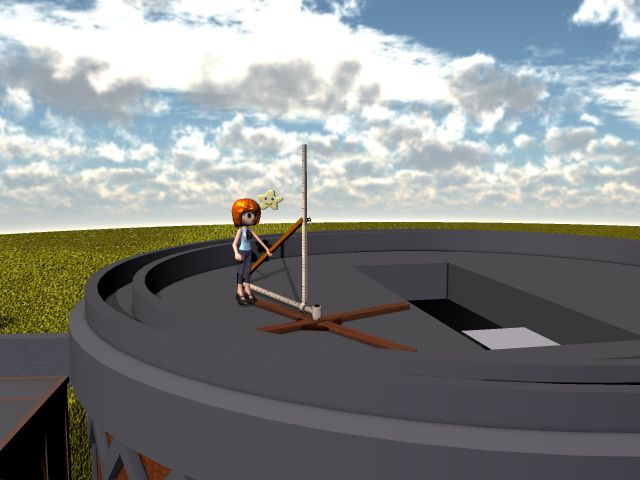 Below is a scope-like tool. It didn't include a lens; the scope was apparently just to shield your eyes from ambient light while observing moon and stars in partial daylight.
Below is a scope-like tool. It didn't include a lens; the scope was apparently just to shield your eyes from ambient light while observing moon and stars in partial daylight.
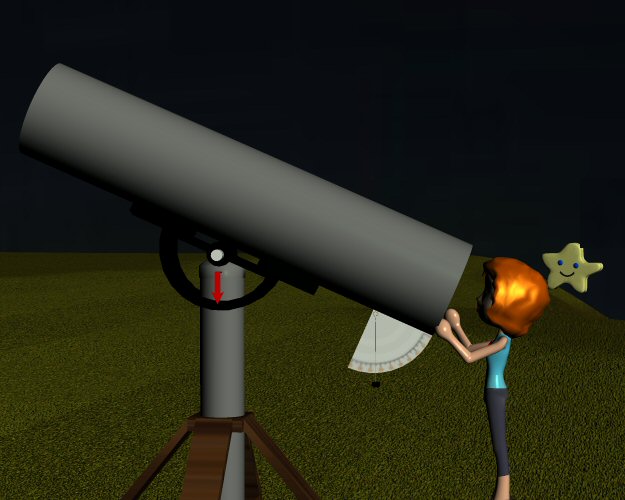
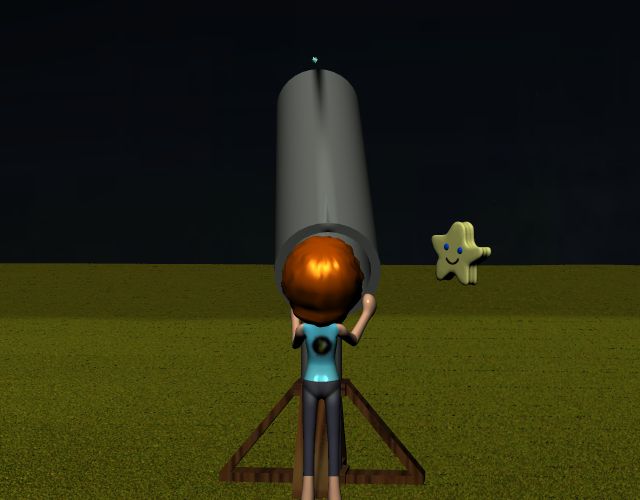 Instrument 12 uses the alidades to create a pinhole image of an eclipse. The astronomer would then be able to time the eclipse exactly as it passed across the lines on her eclipse transit. This presaged the time-measuring transits and Personal Equation Machines of a later century.
Instrument 12 uses the alidades to create a pinhole image of an eclipse. The astronomer would then be able to time the eclipse exactly as it passed across the lines on her eclipse transit. This presaged the time-measuring transits and Personal Equation Machines of a later century.
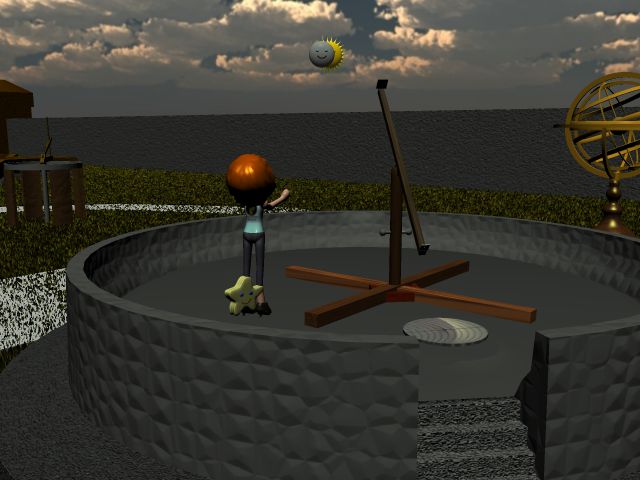 = = = = =
Returning to the start of this set and tying up the threads:
AstroLOGY was the SCIENCE of the stars. AstroNOMY was nothing more than naming the stars.
Astrology was an attempt to observe and predict the patterns of the universe. Astrologers understood that humans are both passive recipients and active participants in the wave patterns. Astrologers were trying to help us with the passive part, by predicting both the physical and emotional weather of future days. Kepler and Brahe were the last true scientists in astrology. After Kepler, lenses replaced alidades, and astronomers became nothing more than namers. They saw more and more dots, and named the dots, but no longer tried to serve people by perceiving the patterns of the dots.
From my first writeup:
Why no lenses? My first thought was that glass wasn't available, but that's exactly wrong. Glass technology was highly developed in that part of the world 15000 years ago in the Bronze Age, and many practical and artistic glass items were found in the same place and era as the observatory. Even worse, some of the scholars who wrote about the observatory ALSO wrote in detail about glass technology. So refined glass tech was right there in the same place and in the same minds. Why didn't they look at the moon through the bottom of a bottle and think Eureka? We'll never know.
Now I've got a hypothesis, if not an explanation.
Alidades let your eyes and brain connect DIRECTLY with Nature. Lenses are one degree of separation from reality. Photography and math and computers create total separation and abstraction. No feedback or participation. Feedback is physically impossible in software.
We are meant to connect with reality ACTIVELY.
The old Persian scientists, trailed by Kepler and Brahe, understood this fact and built their instruments accordingly. Russians later returned to it, but Westerners have forgotten it.
Visual and auditory perception are NOT passive. The retina and the cochlea are constantly reshaped in ways that can be seen and measured, in order to focus on one desired signal and ignore uninteresting signals.
One new bit of research ties into the eclipse and transit theme. The pupils adjust their size automatically in response to the number of objects in the area of focus. More objects, bigger pupils. A measurable change.
= = = = =
Here's a hypothesis that agrees with neural and electronic reality:
Typically we regard eyes and ears and cameras and microphones as transducers. Our senses are transponders, not transducers. The brain receives and resonates and MODIFIES the overall wave pattern of the universe. Its own momentarily tuned resonances influence the overall pattern in a minuscule way, just as the momentary tuned resonance of one guitar influences the overall sound patterns in the room. This influence may well be an active radiation of waves. Other animals and plants actively radiate waves. Plants send out electrostatic fields, fish send actual radio waves. An antenna-like structure in our cerebellum is strongly suggestive.
But even without active radiation, our IMPEDANCE can affect the shape of the universe's wave structure, by absorbing or ignoring various frequencies. Our mental activity and attention PHYSICALLY changes our impedance, along with generating waves that can add or cancel the ambient waves. If we are sucking in one frequency, the universe's harmony is deprived of that frequency near us.
Direct perception is CRITICALLY IMPORTANT FOR SURVIVAL in all of our senses. 2020 broke our direct connection to the microbes in the air. Our immune system is no longer allowed to ACTIVELY DEAL WITH MICROBES in an undistorted way. Its perception is distorted and recycled by muzzles and Lucite and distancing, and the direct alidade of the nostril is replaced by the digital lens of the "vaccines" that aren't real vaccines.
We have the infinite gift of life and perception.
USE IT OR LOSE IT.
= = = = =
Links for the Astrometeorology set:
Intro: Opening the doors again
2: James Ferguson
3: From Ferguson to Kepler
4: Maragha and astrolabes
5: Qibla
6: Back to Europe
7: Brahe's star castle (first try)
8: Brahe's star castle, revised.
9: Back to Maragha, this item.
= = = = =
Brahe's star castle released as Poser scene on ShareCG.
Maragha and Ferguson released as Poser scene on ShareCG.
= = = = =
Returning to the start of this set and tying up the threads:
AstroLOGY was the SCIENCE of the stars. AstroNOMY was nothing more than naming the stars.
Astrology was an attempt to observe and predict the patterns of the universe. Astrologers understood that humans are both passive recipients and active participants in the wave patterns. Astrologers were trying to help us with the passive part, by predicting both the physical and emotional weather of future days. Kepler and Brahe were the last true scientists in astrology. After Kepler, lenses replaced alidades, and astronomers became nothing more than namers. They saw more and more dots, and named the dots, but no longer tried to serve people by perceiving the patterns of the dots.
From my first writeup:
Why no lenses? My first thought was that glass wasn't available, but that's exactly wrong. Glass technology was highly developed in that part of the world 15000 years ago in the Bronze Age, and many practical and artistic glass items were found in the same place and era as the observatory. Even worse, some of the scholars who wrote about the observatory ALSO wrote in detail about glass technology. So refined glass tech was right there in the same place and in the same minds. Why didn't they look at the moon through the bottom of a bottle and think Eureka? We'll never know.
Now I've got a hypothesis, if not an explanation.
Alidades let your eyes and brain connect DIRECTLY with Nature. Lenses are one degree of separation from reality. Photography and math and computers create total separation and abstraction. No feedback or participation. Feedback is physically impossible in software.
We are meant to connect with reality ACTIVELY.
The old Persian scientists, trailed by Kepler and Brahe, understood this fact and built their instruments accordingly. Russians later returned to it, but Westerners have forgotten it.
Visual and auditory perception are NOT passive. The retina and the cochlea are constantly reshaped in ways that can be seen and measured, in order to focus on one desired signal and ignore uninteresting signals.
One new bit of research ties into the eclipse and transit theme. The pupils adjust their size automatically in response to the number of objects in the area of focus. More objects, bigger pupils. A measurable change.
= = = = =
Here's a hypothesis that agrees with neural and electronic reality:
Typically we regard eyes and ears and cameras and microphones as transducers. Our senses are transponders, not transducers. The brain receives and resonates and MODIFIES the overall wave pattern of the universe. Its own momentarily tuned resonances influence the overall pattern in a minuscule way, just as the momentary tuned resonance of one guitar influences the overall sound patterns in the room. This influence may well be an active radiation of waves. Other animals and plants actively radiate waves. Plants send out electrostatic fields, fish send actual radio waves. An antenna-like structure in our cerebellum is strongly suggestive.
But even without active radiation, our IMPEDANCE can affect the shape of the universe's wave structure, by absorbing or ignoring various frequencies. Our mental activity and attention PHYSICALLY changes our impedance, along with generating waves that can add or cancel the ambient waves. If we are sucking in one frequency, the universe's harmony is deprived of that frequency near us.
Direct perception is CRITICALLY IMPORTANT FOR SURVIVAL in all of our senses. 2020 broke our direct connection to the microbes in the air. Our immune system is no longer allowed to ACTIVELY DEAL WITH MICROBES in an undistorted way. Its perception is distorted and recycled by muzzles and Lucite and distancing, and the direct alidade of the nostril is replaced by the digital lens of the "vaccines" that aren't real vaccines.
We have the infinite gift of life and perception.
USE IT OR LOSE IT.
= = = = =
Links for the Astrometeorology set:
Intro: Opening the doors again
2: James Ferguson
3: From Ferguson to Kepler
4: Maragha and astrolabes
5: Qibla
6: Back to Europe
7: Brahe's star castle (first try)
8: Brahe's star castle, revised.
9: Back to Maragha, this item.
= = = = =
Brahe's star castle released as Poser scene on ShareCG.
Maragha and Ferguson released as Poser scene on ShareCG.
 The central tower was an open observatory, essentially a raised platform.
The central tower was an open observatory, essentially a raised platform.
 The large rectangular building was the 'commons' for meetings and classes.
The large rectangular building was the 'commons' for meetings and classes.
 I've imagined the interior of a residence, using the Persianish furniture that I 'built' for Brahe's castle. Brahe was directly following the Persian tradition in his instruments and his astrometeorology and his architecture. Here Polistra is calculating with an astrolabe.
I've imagined the interior of a residence, using the Persianish furniture that I 'built' for Brahe's castle. Brahe was directly following the Persian tradition in his instruments and his astrometeorology and his architecture. Here Polistra is calculating with an astrolabe.
 This is the tool that archeologists call Instrument 3. It's a simple sighter for both azimuth and altitude. Polistra is trying to realign with the beacons of the universe.
This is the tool that archeologists call Instrument 3. It's a simple sighter for both azimuth and altitude. Polistra is trying to realign with the beacons of the universe.

 The sighting bar with two pinholes or gunsights is the alidade. It's the key element of these instruments and astrolabes.
The sighting bar with two pinholes or gunsights is the alidade. It's the key element of these instruments and astrolabes.
 Another view of Instrument 3 in the full scene:
Another view of Instrument 3 in the full scene:
 Instrument 11 was unique in its ability to switch measurement modes.
Instrument 11 was unique in its ability to switch measurement modes.
 The vertical measuring stick pivoted on the horizontal rod so that it could be used two ways:
The vertical measuring stick pivoted on the horizontal rod so that it could be used two ways:
 When the measuring stick was horizontal, it measured the azimuth:
When the measuring stick was horizontal, it measured the azimuth:
 And when the measuring stick was vertical, it measured the altitude of the alidade:
And when the measuring stick was vertical, it measured the altitude of the alidade:
 Here Polistra is using Instrument 11 from the top of the tower.
Here Polistra is using Instrument 11 from the top of the tower.
 Below is a scope-like tool. It didn't include a lens; the scope was apparently just to shield your eyes from ambient light while observing moon and stars in partial daylight.
Below is a scope-like tool. It didn't include a lens; the scope was apparently just to shield your eyes from ambient light while observing moon and stars in partial daylight.

 Instrument 12 uses the alidades to create a pinhole image of an eclipse. The astronomer would then be able to time the eclipse exactly as it passed across the lines on her eclipse transit. This presaged the time-measuring transits and Personal Equation Machines of a later century.
Instrument 12 uses the alidades to create a pinhole image of an eclipse. The astronomer would then be able to time the eclipse exactly as it passed across the lines on her eclipse transit. This presaged the time-measuring transits and Personal Equation Machines of a later century.
 = = = = =
Returning to the start of this set and tying up the threads:
AstroLOGY was the SCIENCE of the stars. AstroNOMY was nothing more than naming the stars.
Astrology was an attempt to observe and predict the patterns of the universe. Astrologers understood that humans are both passive recipients and active participants in the wave patterns. Astrologers were trying to help us with the passive part, by predicting both the physical and emotional weather of future days. Kepler and Brahe were the last true scientists in astrology. After Kepler, lenses replaced alidades, and astronomers became nothing more than namers. They saw more and more dots, and named the dots, but no longer tried to serve people by perceiving the patterns of the dots.
From my first writeup:
Why no lenses? My first thought was that glass wasn't available, but that's exactly wrong. Glass technology was highly developed in that part of the world 15000 years ago in the Bronze Age, and many practical and artistic glass items were found in the same place and era as the observatory. Even worse, some of the scholars who wrote about the observatory ALSO wrote in detail about glass technology. So refined glass tech was right there in the same place and in the same minds. Why didn't they look at the moon through the bottom of a bottle and think Eureka? We'll never know.
Now I've got a hypothesis, if not an explanation.
Alidades let your eyes and brain connect DIRECTLY with Nature. Lenses are one degree of separation from reality. Photography and math and computers create total separation and abstraction. No feedback or participation. Feedback is physically impossible in software.
We are meant to connect with reality ACTIVELY.
The old Persian scientists, trailed by Kepler and Brahe, understood this fact and built their instruments accordingly. Russians later returned to it, but Westerners have forgotten it.
Visual and auditory perception are NOT passive. The retina and the cochlea are constantly reshaped in ways that can be seen and measured, in order to focus on one desired signal and ignore uninteresting signals.
One new bit of research ties into the eclipse and transit theme. The pupils adjust their size automatically in response to the number of objects in the area of focus. More objects, bigger pupils. A measurable change.
= = = = =
Here's a hypothesis that agrees with neural and electronic reality:
Typically we regard eyes and ears and cameras and microphones as transducers. Our senses are transponders, not transducers. The brain receives and resonates and MODIFIES the overall wave pattern of the universe. Its own momentarily tuned resonances influence the overall pattern in a minuscule way, just as the momentary tuned resonance of one guitar influences the overall sound patterns in the room. This influence may well be an active radiation of waves. Other animals and plants actively radiate waves. Plants send out electrostatic fields, fish send actual radio waves. An antenna-like structure in our cerebellum is strongly suggestive.
But even without active radiation, our IMPEDANCE can affect the shape of the universe's wave structure, by absorbing or ignoring various frequencies. Our mental activity and attention PHYSICALLY changes our impedance, along with generating waves that can add or cancel the ambient waves. If we are sucking in one frequency, the universe's harmony is deprived of that frequency near us.
Direct perception is CRITICALLY IMPORTANT FOR SURVIVAL in all of our senses. 2020 broke our direct connection to the microbes in the air. Our immune system is no longer allowed to ACTIVELY DEAL WITH MICROBES in an undistorted way. Its perception is distorted and recycled by muzzles and Lucite and distancing, and the direct alidade of the nostril is replaced by the digital lens of the "vaccines" that aren't real vaccines.
We have the infinite gift of life and perception.
USE IT OR LOSE IT.
= = = = =
Links for the Astrometeorology set:
Intro: Opening the doors again
2: James Ferguson
3: From Ferguson to Kepler
4: Maragha and astrolabes
5: Qibla
6: Back to Europe
7: Brahe's star castle (first try)
8: Brahe's star castle, revised.
9: Back to Maragha, this item.
= = = = =
Brahe's star castle released as Poser scene on ShareCG.
Maragha and Ferguson released as Poser scene on ShareCG.
= = = = =
Returning to the start of this set and tying up the threads:
AstroLOGY was the SCIENCE of the stars. AstroNOMY was nothing more than naming the stars.
Astrology was an attempt to observe and predict the patterns of the universe. Astrologers understood that humans are both passive recipients and active participants in the wave patterns. Astrologers were trying to help us with the passive part, by predicting both the physical and emotional weather of future days. Kepler and Brahe were the last true scientists in astrology. After Kepler, lenses replaced alidades, and astronomers became nothing more than namers. They saw more and more dots, and named the dots, but no longer tried to serve people by perceiving the patterns of the dots.
From my first writeup:
Why no lenses? My first thought was that glass wasn't available, but that's exactly wrong. Glass technology was highly developed in that part of the world 15000 years ago in the Bronze Age, and many practical and artistic glass items were found in the same place and era as the observatory. Even worse, some of the scholars who wrote about the observatory ALSO wrote in detail about glass technology. So refined glass tech was right there in the same place and in the same minds. Why didn't they look at the moon through the bottom of a bottle and think Eureka? We'll never know.
Now I've got a hypothesis, if not an explanation.
Alidades let your eyes and brain connect DIRECTLY with Nature. Lenses are one degree of separation from reality. Photography and math and computers create total separation and abstraction. No feedback or participation. Feedback is physically impossible in software.
We are meant to connect with reality ACTIVELY.
The old Persian scientists, trailed by Kepler and Brahe, understood this fact and built their instruments accordingly. Russians later returned to it, but Westerners have forgotten it.
Visual and auditory perception are NOT passive. The retina and the cochlea are constantly reshaped in ways that can be seen and measured, in order to focus on one desired signal and ignore uninteresting signals.
One new bit of research ties into the eclipse and transit theme. The pupils adjust their size automatically in response to the number of objects in the area of focus. More objects, bigger pupils. A measurable change.
= = = = =
Here's a hypothesis that agrees with neural and electronic reality:
Typically we regard eyes and ears and cameras and microphones as transducers. Our senses are transponders, not transducers. The brain receives and resonates and MODIFIES the overall wave pattern of the universe. Its own momentarily tuned resonances influence the overall pattern in a minuscule way, just as the momentary tuned resonance of one guitar influences the overall sound patterns in the room. This influence may well be an active radiation of waves. Other animals and plants actively radiate waves. Plants send out electrostatic fields, fish send actual radio waves. An antenna-like structure in our cerebellum is strongly suggestive.
But even without active radiation, our IMPEDANCE can affect the shape of the universe's wave structure, by absorbing or ignoring various frequencies. Our mental activity and attention PHYSICALLY changes our impedance, along with generating waves that can add or cancel the ambient waves. If we are sucking in one frequency, the universe's harmony is deprived of that frequency near us.
Direct perception is CRITICALLY IMPORTANT FOR SURVIVAL in all of our senses. 2020 broke our direct connection to the microbes in the air. Our immune system is no longer allowed to ACTIVELY DEAL WITH MICROBES in an undistorted way. Its perception is distorted and recycled by muzzles and Lucite and distancing, and the direct alidade of the nostril is replaced by the digital lens of the "vaccines" that aren't real vaccines.
We have the infinite gift of life and perception.
USE IT OR LOSE IT.
= = = = =
Links for the Astrometeorology set:
Intro: Opening the doors again
2: James Ferguson
3: From Ferguson to Kepler
4: Maragha and astrolabes
5: Qibla
6: Back to Europe
7: Brahe's star castle (first try)
8: Brahe's star castle, revised.
9: Back to Maragha, this item.
= = = = =
Brahe's star castle released as Poser scene on ShareCG.
Maragha and Ferguson released as Poser scene on ShareCG.
Labels: Equipoise
